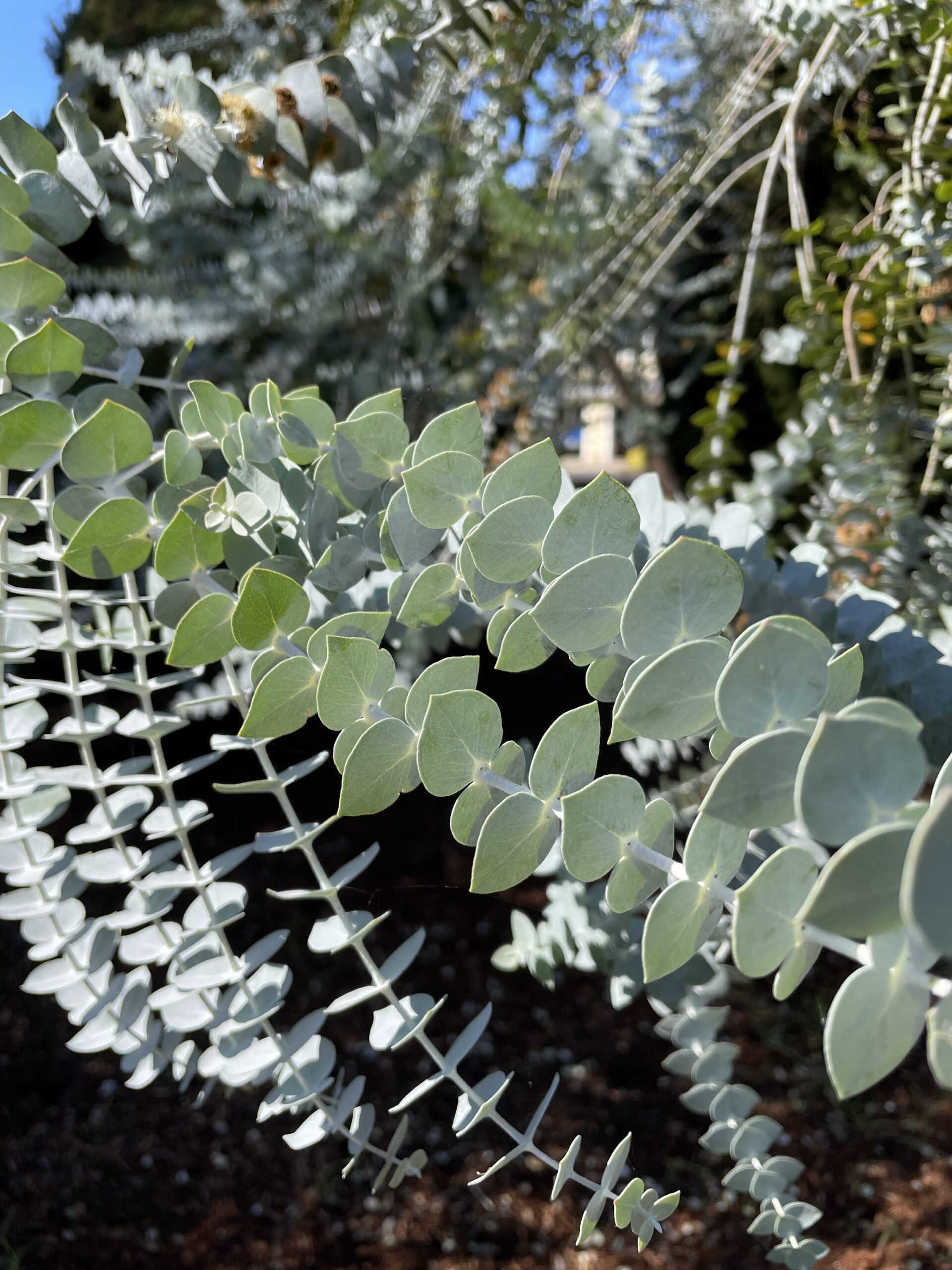
Article published in the News-Review October 11, 2024
By: Janet Bitter
Question: I want to grow some eucalyptus to use for decorating and in flower arrangements. Is that possible in our climate?
Answer: It most certainly is possible to grow eucalyptus in our zone! If you have ever lived in California, you probably recall the numerous eucalyptus trees, along with the distinct smell of eucalyptus. The genus Eucalyptus is in the family Myrtaceae, or myrtle family. Without getting too much in the taxonomic jungle, you may think that this means eucalyptus is related to our native myrtle trees. Guess what? You are incorrect! The myrtle family includes other pungent plants such as the spices clove and allspice but does not include our Oregon myrtle trees.
In their native Australia and New Zealand, eucalyptus are called “gums” (I can hear you humming the old campfire favorite, “Kookaburra sits in the old gum tree….”). Eucalyptus oil is used in some herbal remedies. It should not be ingested as small amounts can be quite toxic. Some people can experience minor skin irritation when handling bark or leaves.
Given the toxicity of ingesting eucalyptus, are you wondering about koalas and their almost-exclusive eucalyptus leaf diet? Well, koalas have special enzymes that allow them to break down the toxic compounds found in eucalyptus. Another interesting fact (especially if you’ve ever seen koalas in person and were less than excited about their lack of movement): the leaves are so low in nutrients that koalas need more sleep to conserve energy. Okay, back to Oregon…
There are hundreds of species of eucalyptus, but only a handful can survive our colder temperatures. Oregon State University Extension Service has a brochure titled, “Landscape Plants” which lists 8 species of eucalyptus suitable for growing in our state. The one most people are interested in growing for its ornamental use is the silver dollar eucalyptus, Eucalyptus cinerea. This variety is a commercial florist staple and is often used in dried floral arrangements. The recommended USDA Zones for this tree are 8a-11. Most of Roseburg is in Zone 8b so you can give this variety a try with fairly good success. Of course, if we have a colder than normal winter, your tree may freeze down and look dead but will likely recover and send out new shoots in the spring. In some places of the country, gardeners treat eucalyptus as an annual. I have a silver dollar in my yard, planted by the previous homeowner, that is over 30 years old. Occasionally it suffers through the winter and dies back, but it has always recovered.
Your planting site should be in full sun, with good drainage. Eucalyptus will not tolerate much shade in our cooler climate. Eucalyptus are deer resistant. They are considered a drought-tolerant plant. After the first year, they can survive on little to no extra water. Because our soil is usually so much richer than the soils in their native habitats, they can grow amazingly fast. Some varieties can grow 6’ in one year. They are not bothered by many pests or diseases.
One other interesting fact about the genus Eucalyptus: they are heterophyllous, meaning there can be different types of leaves on the same plant. Seedling, juvenile, and mature leaves can all be different shapes. The silver dollar leaves that are desired in the floral industry are the juvenile form. (Mine seldom has anything but these juvenile leaves on it.) If you are trying to identify a species of eucalyptus, keep this in mind—you may see round juvenile leaves as well as elliptical shaped leaves on the same plant. Other species besides the E. cinerea may have desirable juvenile foliage.
If you are interested in viewing several types of eucalyptus in Oregon, the Oregon Garden in Silverton has several of the species mentioned in the OSU pamphlet. Because this species is fast-growing for a tree, there is interest from the commercial wood products industry. Maybe one day you will see large groves of eucalyptus in the Northwest.
It’s fun to try out unusual plants. If you are someone with an interest in floral design or home décor craft projects, growing some silver dollar eucalyptus might be in your future.
Do you have a gardening or insect question? Contact the Douglas County Master Gardeners at douglasmg@oregonstate.edu or 541-672-4461 or visit 1134 SE Douglas Ave., Roseburg. Douglas County Master Gardeners are trained volunteers who help the OSU Extension Service serve the people of Douglas County.


